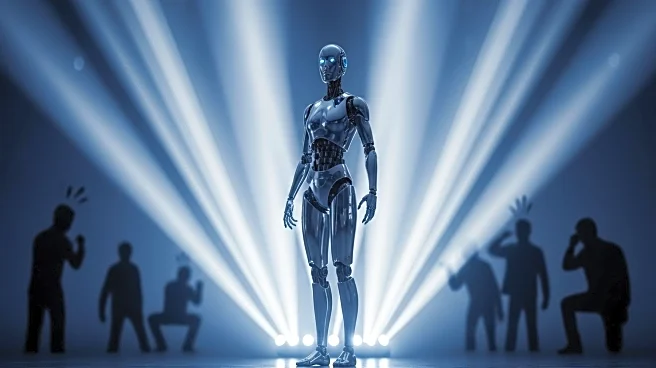What's Happening?
The introduction of Tilly Norwood, the world's first AI actress, has provoked significant backlash from Hollywood actors and the Screen Actors Guild-American Federation of Television and Radio Artists (SAG-AFTRA). Tilly Norwood, developed by the film production company Particle6, is part of the newly launched AI acting studio 'Xicoia.' The studio was announced at the Zurich Film Festival, and Norwood is set to be signed to a talent agency. SAG-AFTRA has condemned the use of AI actors, stating that Norwood is not a real actor but a computer-generated character created from the performances of professional actors without their consent. The union argues that this practice threatens actors' jobs and undermines human artistry. Several actors, including Emily Blunt and Melissa Barrera, have publicly criticized the emergence of AI actors, expressing concerns over the loss of human connection and the ethical implications of using AI in acting.
Why It's Important?
The controversy surrounding AI actress Tilly Norwood highlights a significant tension between technological innovation and traditional industries. The use of AI in acting raises ethical questions about intellectual property and the potential displacement of human actors. This development could have far-reaching implications for the entertainment industry, potentially altering how films are produced and who gets to participate in them. The backlash from SAG-AFTRA and prominent actors underscores the fear of job loss and the erosion of human creativity in favor of AI-generated performances. If AI actors become more prevalent, it could lead to a shift in how talent is valued and compensated in Hollywood, affecting the livelihoods of many professionals in the industry.
What's Next?
The ongoing debate over AI actors is likely to intensify as more studios explore the use of AI in film production. SAG-AFTRA and other industry stakeholders may push for regulations or guidelines to protect human actors' rights and ensure fair compensation. The entertainment industry will need to address the ethical and legal challenges posed by AI technology, balancing innovation with the preservation of human artistry. As the situation develops, it will be crucial for industry leaders to engage in dialogue with technology developers to find solutions that respect both technological advancements and the contributions of human performers.
Beyond the Headlines
The emergence of AI actors like Tilly Norwood could lead to broader discussions about the role of AI in creative industries. This development may prompt a reevaluation of what constitutes art and creativity, as well as the value of human input in artistic endeavors. The controversy also raises questions about the future of work in industries susceptible to automation, highlighting the need for policies that support workers in adapting to technological changes. As AI continues to evolve, society will need to grapple with its implications for culture, employment, and the definition of human creativity.









